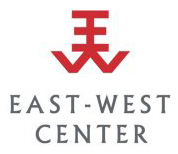Registration |
Opening Session Welcome
-Warren Luke – Chairman of PBEC
-Dr. Charles E. Morrison – President of EWC
-Lieutenant Governor Brian Schatz, State of Hawaii |
Plenary: Insights and Trends
-Mark Spiegel, Vice President of International Research and Director of the Center for Pacific Basin Studies at the Federal Reserve Bank of San Francisco
The Federal Reserve Bank monitors and predicts patterns across economies, with their most recent findings evidencing structural shifts in APEC economies. In this speech, Mark Spiegel will provide timely insights and breaking trends impacting the state of the economies across the Asia-Pacific region.
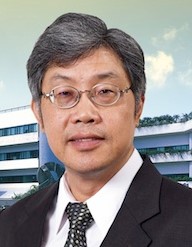 |
Mark Spiegel is Vice President, International Research and Director of the Center for Pacific Basin Studies at the Federal Reserve Bank of San Francisco. Prior to joining the Federal Reserve, he served as an assistant professor in the Department of Economics at New York University. He has served as a visiting professor in the Economics Department of U.C. Berkeley, as well as a lecturer at the Haas School of Business at U.C. Berkeley. He has also served as a consultant at the World Bank, as a visiting scholar at the Bank of Japan, and as Chairman of the Federal Reserve System Committee on International Economic Analysis. Dr. Spiegel received his Ph.D. in economics from the University of California at Los Angeles and his B.A. in economics from the University of California at Berkeley. Dr. Spiegel has published numerous articles in both academic and policy-oriented journals on international financial issues and on economic issues associated with Asian economies. His research has been cited in the popular media, including the Economist, the New York Times, the Wall Street Journal, the Chicago Tribune, and numerous international news publications. He is currently associate editor of the journal Japan and the World Economy. |
|
Plenary: Clean Fuel to Power the Pacific
-Dr. David Robson, Chairman, President and Chief Executive Officer, Tethys Petroleum Limited
APEC intelligence reports have identified key energy risks for the region, encouraging joint public-private sector technological platforms to promote a more efficient allocation of resources.
In his presentation, “Gas from Asia: Clean Fuel to Power the Pacific Rim,” Dr. Robson reveals the future of a tested supply of natural gas (the cleanest of the fossil fuels) to the Chinese and East Asian markets from the fields in Central Asia and Siberia. His overview includes new data on infrastructure available, expansion of infrastructure and the utilization of natural gas to fuel on-shore economies, mainly China, Korea, and the potential for off-shore islands around the eastern part of the Pacific Rim. Clean energy and energy security for the eastern Pacific Rim can be driven by these resources and the development of shale gas and coal bed methane, and their utilization in the gas balance. With the backdrop of the region’s recent nuclear accident, clean natural gas is an important alternative from environmental and economic aspects. Dr. Robson will discuss ways of securing access to these resources from the prolific gas basins adjacent to the Pacific Rim to sustain clean economic development and energy security in the region.
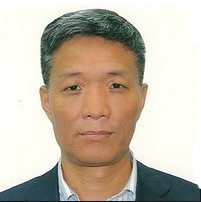 |
Dr. Robson is Chairman, President and Chief Executive Officer of Tethys Petroleum Limited, an oil & gas exploration & production company focused on Central Asia and listed on the Toronto, London and Kazakhstan Stock Exchanges. Tethys Petroleum produces oil and gas in Kazakhstan (where it has recently brought on stream a new oil discovery), oil in Uzbekistan and is exploring a large high potential area in Tajikistan where the Company recently made an oil discovery.
Dr. Robson’s career has been primarily in operating oil and gas companies. He was Chairman, President and Chief Executive Officer, and one of the founders, of CanArgo Energy Corporation, an AMEX listed exploration & production company then operating in Georgia, and Managing Director, Chief Executive Officer and one of the founders of London listed JKX Oil & Gas plc, one of the first international oil and gas companies working in Ukraine and the former Soviet Union. Prior to this he was employed in technical (exploration, operations, petroleum engineering), commercial and managerial positions within Britoil plc, Hamilton Oil (now BHP Petroleum) and Mobil.
Dr. Robson trained as a geologist, obtaining a First Class B.Sc. (Hons.) degree in Geology and a Ph.D in Geochemistry. He also holds an MBA from the University of Strathclyde with his thesis topic being the European Gas Market. Dr. Robson has worked on oil and gas projects in Eastern Europe and the former Soviet Union since 1990, establishing the first non-state gas development project in Ukraine, the first non-state drilling in the Ukrainian Black Sea, the first non-state exploration and development wells in Georgia, the first non-state dry gas production in Kazakhstan and the first Production Sharing Contract in Tajikistan. He has worked in many parts of the former Soviet Union including West Siberia, Sakhalin, the Pechora Sea, Kalmykia, Dagestan, the Caspian and Central Asia.
He is a Fellow of the Geological Society, a member of the Society of Petroleum Engineers, a member of the European Association of Geoscientists and Engineers, a member of the Institute of Directors, he holds the Order of Honour for services to the Georgian Hydrocarbon extraction industry, was formerly the energy sector representative on the UK government’s East European Trade Council and was a founder member of the President of Tajikistan’s Consultative Council on Investment. Dr. Robson has spoken at many international forums on energy related topics in the former Soviet Union and Asia and at the “Paris Club” of donor nations. |
|
Networking Break
An opportunity to mix and meet participants from the Asian Pacific Economies |
Regional Mega-Trends
An opportunity to mix and meet participants from the Asian Pacific Economies |
Plenary: Working Together Toward a Sustainable Future of the Asia-Pacific
-Keith Williams, President and CEO, Underwriters Laboratories and Member, APEC USA Host Committee
What must governments, the academic and research community, and the private sector do to foster more sustainable practices for the Asia-Pacific? Are there common threads across the three sustainability threads addressed here – buildings, energy, and food? What are emerging or horizon issues that factor into these dialogues and public-private partnerships?
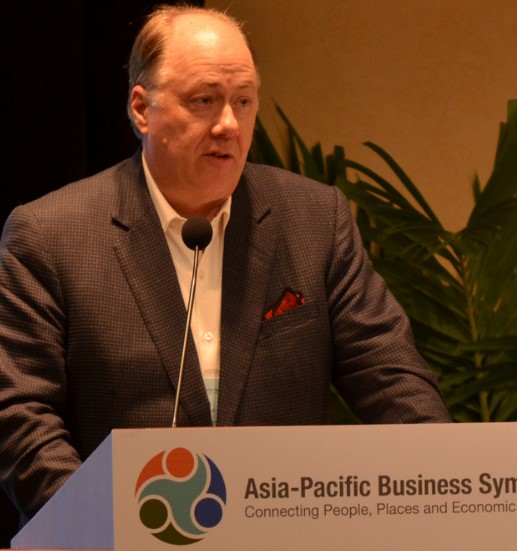 |
On May 1, 2005 Keith Williams became the 10th President of UL (Underwriters Laboratories Inc.) UL is an independent Standards Development Organization, Testing Lab and Certification Body with a Mission to enhance life safety and facilitate global commerce. Founded in 1893, UL is a Chicago based company with worldwide operations in areas of Product Safety, Life and Health Products, Environmental Safety, Verification Services and Education.
Subsequent to earning a Bachelor of Science in Engineering from Case Western Reserve University Keith joined General Electric Company. During a 23-year career at GE he held assignments in global business management, global logistics, marketing and sales. In 1991 Keith move to Singapore and was responsible for all GE Medical Operations in Asia other than Japan. In Singapore he led the development of the Asia-Pacific Parts Logistics Center, which, combined with centers in Europe and America, completed a global service parts logistics network. From 1993 to 1996 he resided in Beijing, China and was President, GE Medical Systems China; fostering the growth of three joint-ventures to create a substantial global engineering and manufacturing base as well as the preeminent local distribution organization. In late 1996 he became the first global champion for using 6 Sigma to address Commercial transactions within GE Medical.
In 1997 Keith was named President, Asia-Pacific Operations for Medtronic Inc. based in Tokyo, Japan; a position he held for five of his eight year Medtronic career. His work in Japan dramatically improved business productivity and revitalized Medtronic’s local Regulatory activities such that the company was often cited by local authorities as Best Practice. Keith established a new focus on China that grew sales from $5M to over $100M. Keith also served as Chief Quality & Regulatory Officer and as President, Spinal & Neurological Business Unit based in Memphis. During his tenure in Memphis Medtronic gained regulatory approval for InFuse, the first protein approved to assist in spinal fusion surgery, and made important acquisitions in the fields of diabetes, artificial spinal disks, and powered surgical tools.
During his 11 years working in Asia Keith served on various Joint-Venture boards including businesses with Samsung, Yokogawa Electric, Wipro, and the Chinese Ministry of Health.
In addition to his work at UL Keith serves as Secretary-Treasurer of the US China Business Council, a Director of the National Fire Protection Association, a Trustee of Opera Memphis and as a Director of the Chicago Council on Global Affairs.. |
|
Luncheon and Speaker
-Harukiho Kuroda, President and Chair of Asian Development Bank
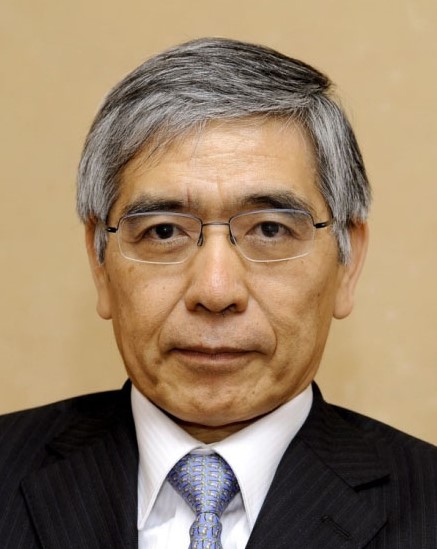 |
Mr. Haruhiko Kuroda is the President of ADB and the Chairperson of ADB’s Board of Directors. Mr. Kuroda was first elected in November 2004, and was subsequently reelected for a full five-year term beginning November 2006. He has been reelected by ADB’s Board of Governors for a further five years beginning November 2011.
Under his stewardship, ADB adopted a new long-term strategy charting the Bank’s strategic course to the year 2020, refocusing ADB’s operational agenda on inclusive economic growth, environmentally sustainable growth and regional cooperation and integration.
During Mr. Kuroda’s tenure, ADB has tripled its capital base from $55 billion to $165 billion, and significantly bolstered its concessional lending window, Asian Development Fund, enabling ADB to push forward on mainstreaming climate change and strengthening support to countries in fragile and conflict-affected situations, among others.
Mr. Kuroda holds a BA in Law from the University of Tokyo and a Master of Philosophy in Economics from the University of Oxford. |
|
Afternoon Concurrent Sessions
Buildings of the Future – New Systems and Tools to Build Sustainable Communities
-Volker Hartkopf, Director, Carnegie Mellon Center for Building Performance and Diagnostics; Chair, United Nations Environment Programme Sustainable Building Contruction Initiative
-Jim Fletcher, IBM Distinguished Engineer, Chief Architect, Tivoli Industry Solutions and Smarter Buildings Architecture
-Wilfred Wong, Executive Deputy Chairman, Hsin Chong Construction Group
-Moderated by Steve Wenc, President, UL Environment
Buildings have a profound impact on our environment. As our global community continues to rapidly urbanize and expand, architects, urban planners, engineers, builders, contractors, appraisers, manufacturers, advocates and policy makers will play a vital role in our ability to create a more sustainable society. As they move deeper into the 21st century, businesses and organizations are joining together to create new systems that are modernizing the way they create communities. Join this panel of experts as they discuss some of the exciting new trends in the building industry, including the expansion of green building designs, adoption of green building codes, emerging standards, systems and tools designed to help build, design and run these buildings smarter.
Food Security & Food Safety
-The Honorable Colleen Hanabusa, Hawai‘i Representative to U.S. Congress
-Catherine Woteki, USDA Chief Scientist and Under Secretary for Research, Education, and Economics
-Daniel W. Piccuta, Foreign Policy Advisor, U.S. Pacific Command
-Stan Tseng, President/Founder, Global Tracking Systems
-Suzanne Case, Executive Director, The Nature Conservancy of Hawaii
-Moderated by MRC Greenwood, President, University of Hawaii
Food security and safety have implications for political, public health, and military security in the APEC region. This session puts into context the urgent need to build the capacity to produce, access, and distribute safe food in the region, as well as develop appropriate food safety regulations. It addresses pressing operational questions such as: What can they do to ensure there is sufficient food to feed the growing number of people? How can they develop efficient and safe distribution systems throughout the supply chain? How can APEC economies build on already established networks and processes to improve international food safety and security? |
Break |
Afternoon Concurrent Sessions
Integrating New Technologies to Power Homes and Businesses of the Future
-Ned Harvey, Chief Operating Officer, Rocky Mountain Institute
-Zhang Dongxia, Deputy Director of Development Strategy Research Center, China Electric Power Research Institute
-Brewster McCracken, Executive Director, Pecan Street Inc.
-Moderated by Jeff Smidt, VP Energy and Industrial Systems, UL
New innovative technologies are needed to power their rapidly expanding cities. The buildings of the future will rely on a different energy distribution system. Getting them to this evolved state will require practical solutions that consider the technological and safety constraints, as well as the economic and environmental needs. In this session, experts will discuss the energy challenges facing today’s society and what the future state may look like when actually integrated into operations. The discussion will also revolve around the types of pressures that define the new technology needs of the future built environment, and what it takes to get there. Some questions that may be addressed: How are cleaner energy generation applications factoring into the workplace? What impact do they have on grid connectedness and power distribution and reliability? How will businesses integrate these technologies into their operations? What implications emerge for home and workplace safety with the increased commercialization of electric vehicles and the emergence of charging stations and battery swapping pilots?
Biofuels: Growth Sector with Diverse Sources, Benefits, and Impacts
-David Cepla, Managing Director of Envergent Technologies
-Jim Spaeth, Director, Office of Commercialization & Project Management, United States Department of Energy
-Maria Tome, Renewable Energy Branch Manager, Department of Business Economic Development & Tourism (DBEDT), State Energy Office
-Kyle Datta, General Partner, Ulupono Initiative
-Chris Tindal, Deputy Director for Renewable Energy, Deputy Asst. Secretary of the Navy
-Moderated by Cecily Barnes, Hawaiian Electric Company, Manager of Biofuels
The promise of biofuels has dramatically transformed into a significant global sector in the past few years, driven by increasing oil prices, national security concerns, environmental considerations, and the efforts to stimulate economic growth in rural communities. The question today is not whether biofuels will be a part of the energy mix, but rather what models are emerging of biofuel production and use. What are the economic, social, and environmental implications of these models that must be considered for future development? This session features four topics that are driving biofuels adoption globally: Market drivers and biofuel models needed to secure financing; Strategic energy needs that influence emerging biofuels; Role of legislation and government policy in shaping the regional industry; Developing a value chain for emergent biofuels uses and testbeds; and a Discussion with the APEC Biofuels Task Force on progress in the region utilizing biofuels to meet critical needs.
Economic Growth, Sustainable Communities, and Indigenous Peoples
-George Atta, Principal, Chief Community Planner, Group 70 International
-Dean Okimoto, Owner and President, Nalo Farms
-Ed Kobel, President and Chief Operating Officer, DeBartolo Development
-Moderated by Alapaki Nahale-a, Chairman, Hawaiian Homes Commission, Dept of Hawaiian Homelands
What does it take to build sustainable communities? |
Break |
Plenary
The Honorable Craig Emerson, Trade Minister, Australia |
Evening Reception
Waikiki Beach Marriott Resort & Spa |
Registration |
Plenary
The Honorable Tim Groser, Minister of Trade, New Zealand |
Break |
Concurrent Sessions
Asia-Pacific Economic and Trade Architecture and the Future of Insurance
-Susan Voss, President of the National Association of Insurance Commissioners
-Charles D. Lake II, Chairman AFLAC Japan
-Jing Ai, PhD, Shidler School of Business University of Hawaii
-Craig M. Watanabe, Strategic Risk Solutions
-Moderated by J.P. Schmidt, Esq., Bays Lung Rose Holma, former Insurance Commissioner State of Hawaii
The primary questions for any private venture or government economic decision are: “What are the risks?” and “How do we manage that risk?” The answer entails an insurance and risk management structure that provides a solid framework to launch economic initiatives and successful ventures. It is essential that the private and governmental structures work together in support and not at cross-purposes. How do insurance and risk management promote and protect sustainable growth? What regulatory principles help the market infrastructure to expand and remain healthy? And what are alternative methods for transferring and managing risk in their rapidly changing economies? This session addresses the role that insurance and risk management play in sustainable economic. Growth, regulatory reforms that can improve existing market infrastructure, and many other drivers that support or restrict SME expansion in the region.
Disaster Preparedness - The Risk Reduction Resilience Initiative (R3 Initiative)
-Alfonso Martinez-Fonts, Senior Vice President, US Chamber of Commerce
-Margaret Davidson, Director Coastal Services, NOAA
-Ray Shirkhodai, Director, Pacific Disaster Center, University of Hawaii
-Amy Searight, Senior Policy Advisor for Asia, USAID
-David Meltzer, Senior Vice President International Service, American Red Cross
-Michael Lesnick, Senior Partner of the Meridian Institute
-Tim Manning, Deputy Administrator for Protection and National Preparedness, FEMA
-Moderated by Richard Berry, Director of Strategic Partnerships, US Pacific Command
Resilience is the capability to anticipate risk, limit impact, and bounce back rapidly through survival, adaptability, evolution, and growth in the face of turbulent change. A resilient community is not only prepared to help prevent or minimize the loss or damage to life, property and the environment, but also it has the ability to quickly return citizens to work, reopen businesses, and restore other essential services needed for a full and swift economic recovery. This panel will address ongoing efforts from the public, private and civil sectors to provide whole of society solutions to help communities minimize any disaster's disruption to everyday life and the local economy.
Economic Development Through Energy Independence
-Qiang Yao, Ph.D., Professor, Department of Thermal Engineering, Tsinghua University, People's Republic of China
-Steve Lindenberg, Senior Advisor, Renewable Energy, U.S. Department of Energy
-Richard C. Lim, Director, Dept of Business, Economic Development and Tourism, State of Hawaii
-Moderated by Gerald Sumida, Chair, Hawaii Clean Energy Initiative (HCEI) and Partner, Carlsmith Ball LLP
As the region builds its economic and energy resiliency, tangible models are emerging of regional economic development driven by energy independence. Economic development focuses on strtegies to spur capital investments to grow the economy, generate markets and businesses, create jobs, develop skilled workforce, and generate tax revenues to improve and expand public services and infrastructure. Now, more than ever, energy is playing a key role in successful economic development strategies and breaking new grounds in Hawaii. The infusion of capital investment in Hawaii’s clean energy industries, which is expected to reach $1.2 billion in 2011, and the proliferation of distributed renewable energy systems and projects, generate thousands of green jobs. These are results of the Hawaii Clean Energy Initiative, launched in 2008 as a partnership between the State of Hawaii and the U.S. Department of Energy (USDOE). This US national testbed and model provides a framework for sustained action to reduce Hawaii’s dependence on imported fossil fuel by at least 70% by 2030. Panelists will speak on successful clean energy transformation programs that promote economic development, and the critical role that the energy market plays in economic growth and development. |
Break |
Concurrent Sessions
Trade Facilitation, Market Access, and Financial Risk Mitigation: Requirements for SMEs in the APEC Region
-Johann Kellerer, Managing Director, Waste and Energy Solutions
-Michael Laurier, CEO of Symphony Environmental Technologies PLC
-Moderated by TBA
World Bank and Asian Development Bank data show that costs associated with trade facilitation, market access, and financial risk mitigation fall disproportionately on small and medium sized enterprises. This conclusion is also supported by studies specific to the APEC region. Key SME growth impediments include:
- Information gaps between the domestic public sector and potential international markets;
- Lack of international marketing expertise and access to adequate financing; and
- Limited political influence across regional markets.
SME development is key to regional economic growth with a direct correlation between the speed of SME expansion and sustained employment opportunities. Targeted, well-designed, trade facilitation programs offer significant benefits to this sector, but accessing them can be challenging to SMEs. In this panel, successful SMEs will share their approaches to trade, market access and financing.
SmartGrid Technologies: Reshaping Economies and Communities of the Future
-Leon Roose, Manager Systems Integration, Hawaiian Electric Company
-James "Jay" Griffin, Ph.D., Assistant Specialist, Hawaii Natural Energy Institute
-Juan Torres, Manager, Energy Surety Engineering & Analysis, Sandia National Laboratories
-Yasuo Tanabe, Vice President and Executive Officer, Government & External Relations, Hitachi Ltd
-Dr. Satoshi Morozumi, Director, Smart Community Promotion Dept, New Energy and Industrial Development Organization (NEDO)
-Moderated by Dr. Phyllis Yoshida, Deputy Assistant Secretary for Asia, Europe and the Americas, U.S. Department of Energy
Panelists will discuss smart grid technologies and development of the Maui Smart Grid project. The Island of Maui in the State of Hawaii has a very high penetration of variable renewable energy generation and was selected as the site for the Hawaii-Japan Smart Grid Demonstration Project. The project is aimed at demonstrating how smart grid technologies can be used to mitigate the system impacts of high penetration of intermittent renewable energy generation on a small island grid, combined with decreasing customer load spurred by Hawaii’s energy efficiency programs, and how to increase the grid’s resiliency to allow further increase in renewable generation.
The speakers will speak on the Maui system issues that the program will be addressing, including the program plans and how smart grid will spur the increased use and development of renewable energy resources in small island economies.
Investing in Health and Driving Economic Growth in the APEC Region
-Art Ushijima, President, The Queen's Medical Center and President & CEO, The Queen's Health Systems
-Nancy Travis, Vice President Global Strategy and Analysis, Advanced Medical Technology Association (AdvaMed)
-Derek Williams, Executive Vise President, Oracle
-Chip Davis, Executive Vice President for Advocacy, PhRMA
-Moderated by Alex Gorsky, Vice Chairman, Johnson & Johnson
The private sector is already playing an instrumental role in the APEC region in helping to build health systems that address modern day disease challenges, improve efficiency, and reduce healthcare costs. Their innovative and well-targeted health investments help economies become healthier and more productive. Research conducted in APEC shows that smart investments in health innovations can deliver very high economic and social returns, of between 7 and 15 times cost, which is higher than many other forms of development investment. With the escalating burden of chronic diseases now slowing productivity, raising healthcare costs, and draining government budgets, APEC economies are in search of new, innovative ways to improve health and wellness and strengthen economic growth. This panel will share the experience of the private sector towards reaching these goals. |
Luncheon and Speaker: What will China’s 12th Five Year Plan Mean to the World?
-Yu Ping, Vice Chairman, China Council for the Promotion of International Trade
and PBEC Director
“China must rapidly engage in a complete transformation of its form of economic development.” Can China move from export led consumption to domestic led consumption; from excessive reliance on exports to balance between export, import and domestic consumption; from reliance on foreign technology to reliance on domestic innovation; from reliance on “old” energy and materials and industries to creation of a low-carbon /new-materials based economy. The new growth model encompasses a healthy and sustainable green growth environment coupled with an emphasis on value added technology.
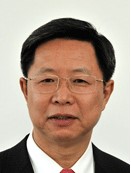 |
Yu Ping currently serves as Vice Chairman of the China Council for the Promotion of International Trade (CCPIT) and the China Chamber of International Commerce, appointments he received in August 2003.
Since joining the Department of International Relations of CCPIT from the Ministry of Foreign Trade in 1977, Mr. Yu has held numerous positions within the CCPIT including Director General of the Personnel Department (2002), Deputy Secretary General (1999), CCPIT US Chief Representative (1995), and Deputy Director of the Division of European Affairs, CCPIT Department of International Relations (1985).
Mr. Yu is a certified Senior Economist (2002) and has completed the Advanced Training Program on International Trade in the Department of Finance and Trade of the Graduate School of the Chinese Academy of Social Sciences. In addition, Mr. Yu has followed the in-service training program for an E M.B.A. from Peking University.
Mr. Yu is a graduate of the Guangzhou Institute of Foreign Languages with a concentration in English (1975) and studied literature and English at Bayero University, Nigeria 1977–1979). |
|
Concurrent Sessions: High Growth Markets
Significant Growth of Latin America Markets Amidst Regional Downturn: Entering These Markets and Partnering Strategies
-Jorge Barreda, Sinolatin Capital
-Consuelo Caldas, Chief Executive, Bogota Chamber of Commerce
-Randy Havre, Principal, Ballesteros Havre & Associates
Investment Interests of The People’s Republic of China: High-Value Opportunities
-Brenda Foster, President, American Chamber of Commerce, Shanghai |
Break |
TBA |
Closing Plenary: APEC and the Future of Asia Pacific Cooperation
-Remarks by The Honorable Daniel K. Inouye, United States Senator
-The Honorable Mazie Hirono, United States Representative
-Lieutenant Governor Brian Schatz, State of Hawaii
-David Carey, President and CEO, Outrigger Enterprises Group
-Kenton Eldridge, Co-Founder and Partner, Aina Koa Pono LLC
This panel, intended primarily for the local audience, is intended to draw the various elements of the symposium together and to discuss what it all means for the future of Hawaii’s economy, which is so deeply wrapped up with the Asia-Pacific region as a whole. How should Hawaii try to position itself following APEC, drawing from what they have heard about changing technologies, challenges and opportunities? |


